Pope Francis, the 266th supreme pontiff of the Roman Catholic Church, whose pontificate emphasized the mercy of God and missionary encounter by today’s disciples of Jesus, died following an extended illness Easter Monday, April 21, 2025 at his residence in the Vatican’s Casa Santa Marta. He was 88.
According to his wishes expressed in 2023, his remains will not be interred in St. Peter’s Basilica, but in St. Mary Major Basilica in Rome, reflecting his devotion to the Blessed Mother.
>>>PHOTO FEATURE: Welcome to Our Home: A Look Back at Pope Francis’ Visit to Philadelphia
Since news of the Holy Father’s death became public, prayers for the repose of his soul and remembrances of his life and pontificate have been expressed by bishops, clergy, religious, and lay people around the world, including in Philadelphia.
Archbishop Pérez: ‘His visit to our city brought us immeasurable joy’
“Along with the people of the Church of Philadelphia and the entire Universal Church, I was deeply saddened to learn of the death of Pope Francis today,” said Archbishop Nelson J. Pérez in a statement. (Read the full statement here.)
“In the midst of great sorrow, we also reflect on the gifts of the Holy Father’s life and ministry with deep gratitude. He tirelessly served the Church for 56 years with great fidelity and zeal. As a Jesuit priest, university professor, local provincial superior, Archbishop of Buenos Aires, a member of the College of Cardinals, and Supreme Pontiff he exhibited selfless dedication on behalf of the souls entrusted to his care.”
Pope Francis visited the city nearly 10 years ago at the conclusion of the memorable World Meeting of Families – Philadelphia 2015. For that reason, he “will always hold a special place in the heart of the Philadelphia region,” said Archbishop Pérez.
“His visit to our city,” he said, “brought us immeasurable joy. That moment in time remains a precious gift that will not be forgotten.”
Archbishop Pérez asked the people of the Archdiocese of Philadelphia “to join me in offering prayers for the happy repose of Pope Francis’ soul. May God grant him the gift of eternal life and bring comfort to a Church in mourning.”
Archbishop Pérez will be the principal celebrant of Mass today (Monday, April 21) for the intention of the happy repose of the soul of Pope Francis at the Cathedral Basilica of Saint Peter and Paul and the Shrine of Saint Katherine Drexel, the Mother Church of the Archdiocese of Philadelphia.
All people of goodwill are invited to participate in person or via live streaming video in prayerful solidarity with Catholics throughout the world as they mourn the death of Pope Francis.
Beginning at 12:05 p.m., the Mass will be streamed live on the Archdiocesan Vimeo website, as well as on the Archdiocese of Philadelphia and Archbishop Pérez’s Facebook pages.
From Argentina, sent to encounter the world
Born Jorge Mario Bergolio on Dec. 17, 1936 in Buenos Aires, Argentina, he was one of five children of Italian immigrants Mario and Regina (Sivori) Bergolio. Following high school and working briefly as a chemical technician, he entered the Society of Jesus and was ordained a Jesuit priest in 1969.
Assignments as a college professor were followed by administrative ones in the Jesuit order. He was named superior of the order in Argentina during a period of military rule and repression in that country during the 1970s.
St. John Paul II appointed him an auxiliary bishop in 1992. Upon the death of his predecessor, Cardinal Antonio Quarracino, he was named Archbishop of Buenos Aires in 1998. He was elevated to the Cardinalate in 2001.
Cardinal Bergolio participated in the conclave that elected Pope Benedict XVI in 2005. When Benedict resigned as pontiff, the cardinal himself was elected on the fifth ballot on March 13, 2013 as the first Jesuit pope in the Church’s history as well as the first from the Western Hemisphere.
In another first, he chose the name Francis for his pontificate, reflecting both St. Francis of Assisi and St. Francis Xavier. The former is known for his service to the poor and reverence for creation, the latter a cofounder of the Jesuit order who spread the Gospel tirelessly in mission lands.
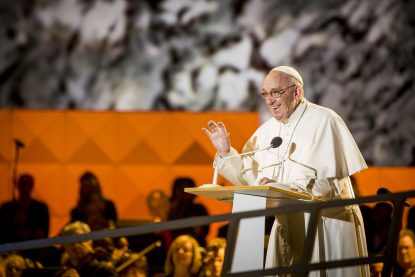
Pope Francis speaks to the crowds gathered on Benjamin Franklin Parkway in Philadelphia Sept. 26, 2015 for the Festival of Families cultural celebration. (Photo by Gustavo Garcia)
Pope Francis set the tone and direction for his 11-year pontificate in the first hours after his election. The crowds gathered to greet him in St. Peter’s Square heard him in a brief address asking them to pray for his ministry before he offered a blessing to them and all people of good will in the world.
The theme of reaching out to all people in prayerful, humble service through his words and actions — with the support of many people and the opposition of others — would define his pontificate.
Pope Francis would sum up this outward thrust of Christian engagement with the world in the word “encounter.” As one encounters the person of Jesus, one experiences the mercy of the Father, who is always ready to reconcile every person to himself, so they may live in unity with all others.
Every Christian, then, is compelled to express this divine encounter with the merciful God in the outward activity of a term coined by the pope: missionary discipleship.
Explaining his vision for the Catholic Church to renew the call of the Second Vatican Council to engage with the world, Pope Francis said in 2013 that he saw the Church as a field hospital, offering comfort and healing to people wounded physically and spiritually.
“I see clearly that the thing the Church needs most today is the ability to heal wounds and to warm the hearts of the faithful; it needs nearness, proximity. I see the Church as a field hospital after battle,” he told America magazine in 2013.
Through frequent gestures he would call the Catholic faithful to put away indifference toward suffering and reach out in love to those often placed on the margins of society.
These included the poor, immigrants, unborn children, the elderly, and people experiencing same-sex attraction.
He called Catholics to show mercy and love to all, and he preached the Church’s broad mission of loving service.
A new style of communicating
Oblate Father Thomas Dailey, a professor of communications and homiletics at St. Charles Borromeo Seminary, believes Pope Francis “changed the papacy from a position to a person, at least in terms of how he interacted with the world,” he said.
“In particular, he shifted the dynamic of papal communications. In him, communications took on the form of conversations, sometimes on subjects not typically discussed, occasionally with new vocabulary not formally used in Church teaching, often leaving arguments not settled. But doing so brought the pope and the Church closer to people and their struggles, especially to those not otherwise engaged in everyday ecclesiastical life.”
Pope Francis, Father Dailey concludes, “made faith real. He made mercy matter. He made the heart central to who we are and who we should be.”
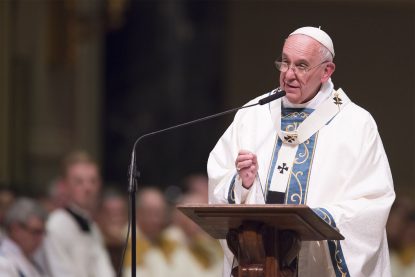
Pope Francis addresses a capacity congregation Sept. 26, 2015 at the Cathedral Basilica of SS. Peter and Paul in Philadelphia. (Photo by Fred Troilo)
His example “as an apostolic preacher offers the Church a guiding light for generations to come,” Father Dailey said.
In his pastoral letters Pope Francis balanced issues of the global stage with those of the family home, always inviting people not to forget those on the margins.
His 2013 Evangelii Gaudium (“The Joy of the Gospel”) dove into the broad issue of economic inequality. It criticized economic and political structures that harm the weak, the defenseless, the forgotten.
In 2015 he followed with Laudato Si’ (“Praise Be to You”), which not only raised an urgent warning about global climate change, but also called for responsible stewardship of the natural world and special care for the poor, those most affected by environmental degradation.
“Pope Francis has taught all of us the importance of encounter, seeing people as God sees them and walking with them on life’s journey,” said Heather Huot, secretary for Catholic Human Services (CHS) of the Archdiocese of Philadelphia. “The prioritization of encounter challenges us open our hearts to the outcasts, the forgotten, the unseen.”
The work of CHS, the umbrella organization for numerous social service agencies that provide care and support for hundreds of thousands of people each year in the Philadelphia region, “exemplifies Pope Francis’ charism of love and mercy,” Huot said.
“Over the 12 years of his pontificate, Pope Francis has stood as a beacon of light guiding us in our service to our sisters and brothers. It is my prayer that we will honor his legacy in our continued pursuit of alleviating suffering and offering hope in our community. We have been so very blessed to have him shepherding us.”
Meeting families in Philadelphia
In 2015 Pope Francis set out on one of his many apostolic journeys including an extended time in the United States that September. It culminated in his major addresses regarding the family in Philadelphia, capping the week-long World Meeting of Families—Philadelphia 2015.
In remarks that ranged from grandfatherly wisdom to presentations of traditional Catholic teaching on the family, the pope reiterated its vital importance for society.
One family directly heard and felt the pope’s outreach as soon as he arrived at the airport in Philadelphia on Sept. 26, 2015.
Chuck Keating, chair of the Fine Arts Department of Bishop Shanahan High School in Downingtown, was directing the school band as the pope’s car traveled along the tarmac. The car stopped and the pope exited the vehicle and walked over to Keating’s family.
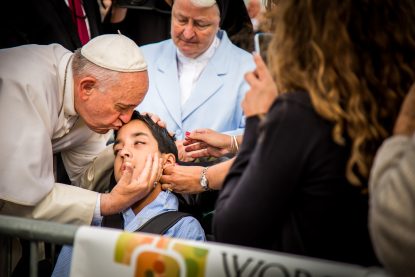
Pope Francis makes an unexpected stop on the tarmac of Philadelphia International Airport Sept. 26, 2015 to greet and bless Michael Keating. (Photo by Joe Gidjunis)
He blessed and kissed the head of then-10-year-old Michael Keating, in a wheelchair with severe disability.
The highly emotional encounter with the Holy Father “has been an incredible influence in our lives,” Chuck Keating said. “Ten years ago, our life was forever changed when Pope Francis blessed our son, Michael.
“We had grown accustomed to seeing Pope Francis embracing lepers, immigrants, and those who were sick with genuine outreach. To have him exit his car, and bless our son, was a grace beyond what we imagined. This simple gesture of reaching out to someone who could not come to him on his own captured the eyes of people not only in Philadelphia, but around the world.
“Our family will be forever blessed for the blessing that was bestowed on Michael,” Keating said.
One person who perhaps was more involved than most with the visit of Pope Francis to the city was Donna Crilley Farrell, executive director of the World Meeting of Families—Philadelphia 2015.
Her leadership of the teams managing nearly every detail of the event from its year-long planning to its week-long execution put her close to the pontiff, and he left a deep impression upon her.
“So much of Pope Francis’ visit to Philadelphia, like his entire ministry, was about reminding us to care for those marginalized by society,” she said. “His talk at Independence Hall was one of the most moving moments of his visit for me. Standing at such a historic symbol of freedom, he addressed the crowd with compassion, speaking directly to so many immigrants in the audience.
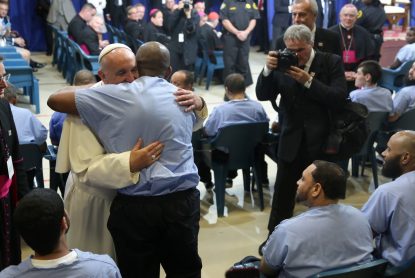
Pope Francis visits with men and women prisoners and their families at Curran Fromhold Correctional Facility in Northeast Philadelphia Sept. 27, 2015. (Photo by Kevin Cook)
“As the first pope from Latin America, his words carried deep meaning when he said, ‘Do not be discouraged by whatever challenges and hardships you face.’ You could feel how much his message resonated—offering hope, strength, and a sense of belonging to those who needed it most.
“It was a powerful reminder of his unwavering commitment to lifting up the marginalized and calling us all to do the same.”
Robert J. Ciaruffoli also had served as a key organizer of the World Meeting of Families and apostolic visit of Pope Francis for more than a year. The excitement that had been building in the region over that time “united our entire community as I had never seen before,” he said.
“His visits to many sites in Philadelphia, from the Festival of Families on the Parkway to the visit with prisoners and their families at the Curran-Fromhold Correctional Facility, put a smile on many faces, both young and old.”
The memory of that September weekend in 2015 “is the gift that keeps giving,” Ciaruffoli said. “Every day since his visit, I have at least one flashback of something that happened during the planning phase and his visit, which puts a smile on my face.”
‘So much excitement,’ up close and on TV
While Ciaruffoli had a front-row seat for all the festivities, others observed from home, but were similarly moved with emotion.
“There was so much excitement and awe in my household during the papal visit,” said Heather Huot of CHS, recalling the hours spent watching the visit unfold on television.
“My daughter was a year old at the time and had not yet spoken her first word. As we watched together, she started to point to Pope Francis on the screen and the next thing we all heard was “Pope” coming out of her mouth! Pope Francis has inspired many people, including my 1-year-old daughter to speak his name,” Huot said.
One little-known vignette from the visit made a lasting memory for Father Matthew Brody, who at the time was a seminarian at St. Charles Borromeo Seminary. He was called upon to serve as the one to hold the book of prayers in close proximity to Pope Francis during the Mass he celebrated Sept. 26, 2015 at the Cathedral Basilica of SS. Peter and Paul.
“It was a powerful experience as a young seminarian, but the memory has remained with me through my first eight years of priesthood,” said Father Brody, now pastor of St. Richard Parish in South Philadelphia.
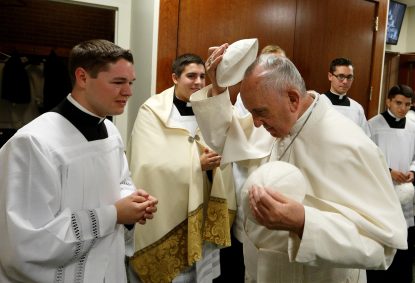
Then-seminarian, now Father Matthew Brody (left) offers Pope Francis a white zucchetto, which he blessed for Father Brody to the delight of the seminarians of St. Charles Borromeo Seminary preparing to serve at the altar for Mass that the pope celebrated Sept. 26, 2015 at the Cathedral Basilica of SS. Peter and Paul in Philadelphia.
The young man hoped the Holy Father would continue a custom that called for a person to present the visiting pontiff with a zucchetto — the white skull cap worn by a pope — who would briefly wear it before returning it with a blessing.
This Pope Francis did, to then-seminarian Matthew Brody’s delight along with his seminarian friends, who hoped they’d given the pontiff a correctly sized cap.
“He put mine on his head for a few moments and then gave it back to me. I still have the zucchetto on display at Our Lady of Mount Carmel (Parish in Doylestown), where I was last stationed!” said Father Brody.
In 2016 Pope Francis followed with the apostolic letter Amoris Laetitia (“The Joy of Love”) in which he amplified those Church teaching on the family to address current realities present in families. These included pastoral approaches to divorced Catholics, and family members with same-sex attraction.
During his pontificate, Pope Francis continued to grapple with the Church’s response to the grave sin of child sexual abuse within the Church. As historical instances of abuse in numerous countries came to light, the pope oversaw the introduction of new procedures for dealing with priests and bishops credibly accused of abuse, as well as strengthening norms for protecting young people in Church settings.
Ground-breaking papal visits across the globe
His apostolic visits, continuing the pattern set by St. John Paul II, took Pope Francis to nearly every continent, including where Catholicism or Christianity were not the dominant ones practiced.
His September 2024 trip to Luxembourg and Belgium was his 46th outside of Italy. Within those trips he balanced visits to traditionally Catholic countries in North and South America (11 countries) with visits to mixed Catholic, Orthodox, and Protestant countries in Europe (26), with visits to Africa (9), and Asia (13), particularly in predominantly Muslim lands such as the Persian Gulf (6).
Pope Francis broke new ground for apostolic visits by a pontiff. He was the first pope to visit Myanmar (2017), Iraq (2021), Mongolia (2023), and Timor Leste (2024). He was the first to visit a country in an active war zone in the Central African Republic (2015) He was also the first seated Pontiff to address both houses of the United States Congress (2015).
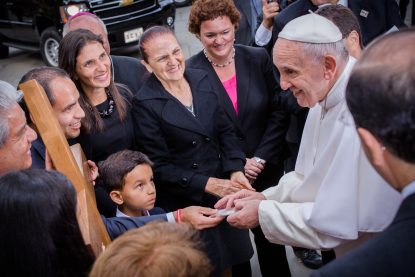
A family speaks with Pope Francis Sept. 26, 2015 at Independence Hall in Philadelphia. (Photo by Dave Christenson)
Along the way migration was often a key theme of the pope’s public addresses. He called for respect for the human rights of migrants, especially their right to seek a better way of life, and called on receiving countries to welcome migrants and refugees by meeting their basic needs with grace and dignity.
He placed his call for compassionate care firmly in the context of Catholic social teaching and within the theme of mercy – the gift of God the Father and the imperative for Christ’s missionary disciples.
“The pontificate of Pope Francis was marked by a real focus on the Church and her members in the peripheries of the world,” Father Brody said. “He encouraged us to embrace a missionary spirit to bring our Catholic faith to the people around us and to announce the message of the Gospel to those most in need of hearing it.”
Father Brody was one of nearly a dozen priests of the Archdiocese of Philadelphia to be designated Missionaries of Mercy by Pope Francis in 2023. This initiative was an outgrowth of the Pontiff’s Jubilee Year of Mercy in 2016.
“It is clear that sharing God’s mercy in the sacrament of confession was an important theme during Pope Francis’ papacy,” said the priest. “While every priest is called to extend the love of God to all who approach the confessional, Pope Francis gave special faculties (permissions) to the Missionaries of Mercy to forgive particular serious sins which are normally reserved to the Holy See.
Father Brody said he considers it “a privilege to serve in this capacity and to continue the late Holy Father’s work of spreading the Lord’s mercy” through the Sacrament of Reconciliation.
Synodality, prayer and service to those on the margins
In the twilight of his pontificate, Pope Francis launched perhaps his most ambitious and far-reaching initiative, the Synod on Synodality.
Reflecting the Jesuit charism of discernment, the pope called for a three-year process beginning in 2021 throughout the Universal Church in which Catholic faithful, bishops, clergy, and religious were invited to listen prayerfully to the voice of Holy Spirit moving within their lives and converse with one another about the path of the Church.
The process of prayerful communication represented by synodality spawned numerous discussions in local Church communities including the Church of Philadelphia. Reports summarizing the discussions were prepared locally as well as on the national and continental levels.
Two synods of bishops in Rome in 2023 and 2024 considered the findings that emphasized the process listening over development of action plans.
A subject of enthusiasm and some criticism, the process sought to further the goals that Pope Francis enunciated early in his pontificate.
He made reforms of the Roman Curia a priority, forming a council of nine cardinals to advise him and discuss approaches for reorganizing departments and workflows in the Vatican.
Throughout his pontificate, words and gestures expressed publicly earned Pope Francis both praise — such as hugging warmly a physically deformed man — and criticism, such as allowing priests to bless same-sex persons outside of liturgical celebrations.
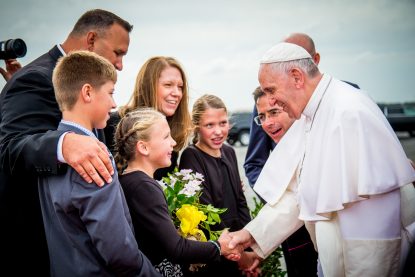
The Bowes family of Northeast Philadelphia welcomes Pope Francis to Philadelphia Sept. 26, 2015. (Photo by Joe Gidjunis)
“I will remember Pope Francis for his great love of the poor and those on the margins of society,” said Father Brody. “I pray that each of us can find a way to embody those priorities in our daily lives to honor of his memory. May Pope Francis find eternal peace in God’s Kingdom.”
Beyond his roles as a mediator for peace in global affairs, shepherd of more than 1.3 billion Catholics, and a prolific writer of books and ecclesial documents, Pope Francis remained a man of deep prayer.
The COVID-19 pandemic affected all peoples around the world, and many turned to prayer to mourn the dead and cope with unforeseen and extraordinary difficulties. Pope Francis addressed them as he presided at a solemn prayer liturgy at the Vatican in March 2020.
He who struggled with physical ailments much of his life took the occasion to raise his prayers to God, through the intercession of the Blessed Virgin Mary, on behalf of the world as it watched on screens worldwide.
“Help us, Mother of Divine Love,” the pope prayed, “to conform ourselves to the Father’s will and to do what Jesus tells us: He who took our sufferings upon Himself, and bore our sorrows to bring us, through the Cross, to the joy of the Resurrection. Amen.”
Guided and taught by his faith from boyhood, confirmed in the sacraments of the Church and tested over a lifetime of service to the Church and the world, Pope Francis has completed his earthly journey and enters the hope for eternal life promised by Jesus Christ, the high priest.
“The life and Petrine Ministry of Pope Francis was a true blessing to the world,” said Archbishop Pérez. “May his example bring us to embrace God’s plan for each of us to serve Christ’s Church on earth as Missionary Disciples.”
PREVIOUS: Canonization of ‘Saint in Sneakers’ to be Celebrated at Malvern Shrine Dedicated to His Life and Message
NEXT: All Invited to Pray for Happy Repose of Pope Francis’ Soul


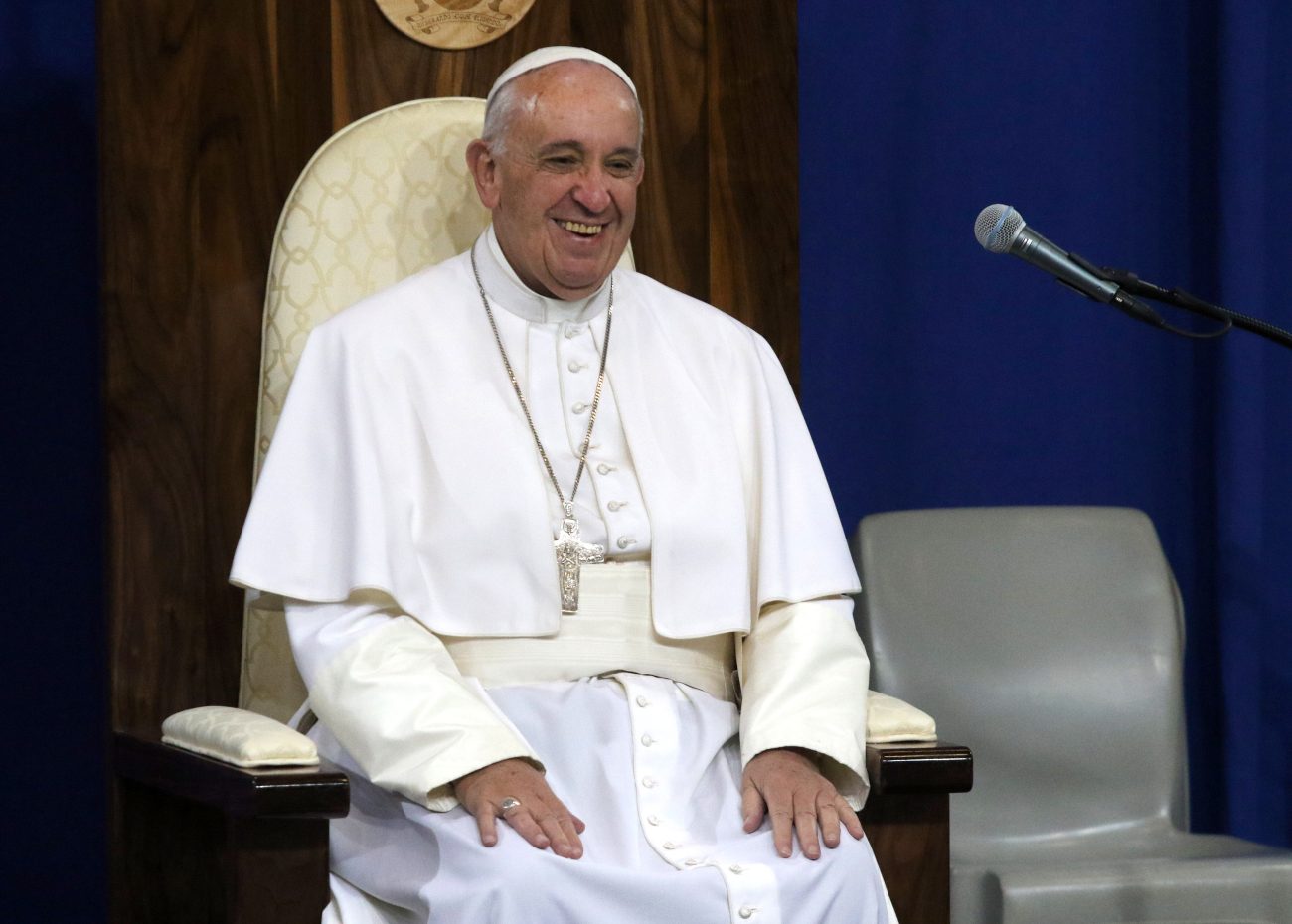
Share this story